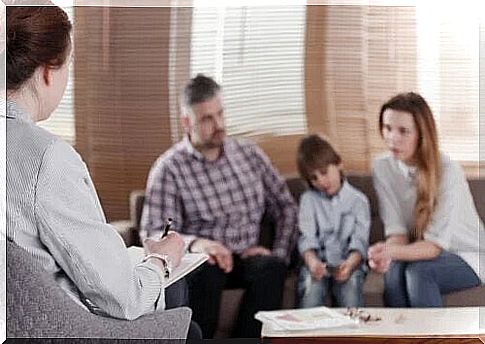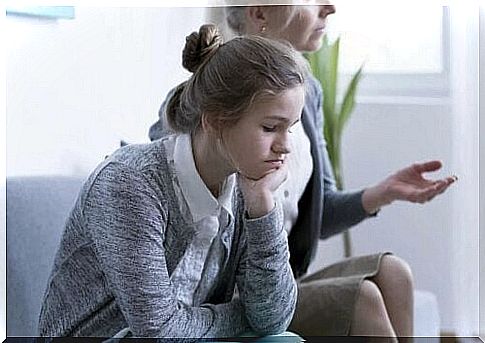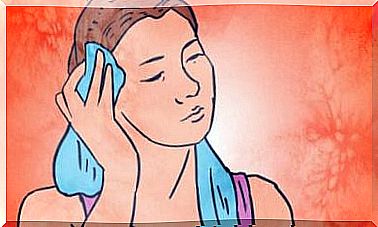When Is It Necessary To Undergo Family Therapy?
Do you think your family’s dynamics are conflicting? In this article, we will explain what family therapy is and when it is necessary to go for it.

Human social relationships are complex, even with family members themselves. The fact of following family therapy is a modality of psychotherapeutic approach which seeks to improve the shortcomings of this linking system.
In this article, we are going to ask ourselves when it is necessary to undergo family therapy. In addition, we will go over some of its most basic principles and in which cases it can be effective.
What is family therapy?
The goal of family therapy is to detect the main problems in the system made up of family members. It is therefore a process of therapeutic support aimed at improving coexistence.
It is common for family therapy to address aspects such as assertive communication, tolerance for frustration, recognizing one’s own emotions and those of others. All this in order to improve the adaptation capacities of those who make up the family system.
This type of therapy is performed by psychologists, licensed therapists and, in some cases, by a clinical social worker. In general, the modality is short-lived, as the main objective is to solve specific problems.
What are the benefits of family therapy?
Let’s see a list of the main benefits of seeing a family therapist. In addition to improving the assertive communication process, there are other important benefits.

1. Does not require the participation of the whole family
While therapy focuses on improving the family system, it does not require all members to attend. Only people who feel the need can go.
The therapist will be able to provide the necessary resources to those undergoing therapy so that they can be agents of change in their family system.
2. Improve the communication process
Communication processes are essential to the well-being of family ties. In many cases, expressive disabilities can generate intense conflict in families. But once communication improves, the problems are resolved.
During the first sessions, the therapist must have the role of translator, so that communication between the people participating in the consultation can be effective. It is about understanding what is the true meaning of a behavior or a sentence and giving the tools to express it.
3. Builds family confidence
Another aspect that generates conflict within a family dynamic is mistrust. When events that damage the bond of trust occur, relationships deteriorate sharply.
To strengthen security, it is necessary to understand that some things cannot be changed and it is necessary to accept them as they happened. Once acceptance occurs, people are relieved.
Eventually, they will be able to regain confidence in the other members of the family. Of course, this process does not work the same way in all cases. In some families, relationships may take longer to restructure.
4. Prevents future conflicts
In psychology, there are underlying and apparent motives. It is thus common that, when a person or a family unit attends a consultation, the reason is only apparent.
Then, as the process progresses, the therapist can find the real reasons for the conflicts and prevent them from getting worse or bringing new problems.
5. Reduce levels of aggression
Aggression is natural in all people. It is a high intensity level that focuses on managing a situation. When we say someone is aggressive we mean they have determination. So it is not the same as being violent.
In family conflicts, it often happens that poorly channeled aggression ends up becoming acts of domestic violence. That is why one of the main goals of the family therapist should be to decrease aggression and move towards more adaptive forms of conflict resolution.
When should you go for family therapy?
In cases where the family is plunged into situations that continuously affect its natural development, it will be necessary to go to a professional. Often people try to seek individualized help first ; in this case, the therapist should offer family therapy.
As we mentioned, not all members can always be included in the process. Ideally, participants do this voluntarily, with the firm conviction of integrating therapeutic resources into their daily lives.
No family is immune to problems. But when conflicts become recurrent and intense, the functioning of the system begins to fail. In this way, we can establish that family therapy becomes necessary when the discomfort is long lasting and intense.

Characteristics of a healthy family
A healthy family, if that expression can be used, is a family that manages its conflicts functionally without the bonds being permanently affected. In this way, there are a series of qualities typical of healthy families:
- Respect for the individual differences of each member.
- Caring for others fairly, without falling into overprotection or neglect.
- Come to agreements of coexistence in common.
- Rules which are not rigid and which can be relaxed if necessary.
- Natural communication without fear of expressing yourself.
What if my family does not want therapy?
In the event of a general refusal to follow family therapy, individual help can be provided to acquire essential means of communication. Then an attempt will be made to get other members to join the process on a voluntary basis.
In some cases, the therapist may also contact family members to invite them to participate in the sessions. It doesn’t matter whether you attend it individually; taking the first step is a start to improving conditions.









